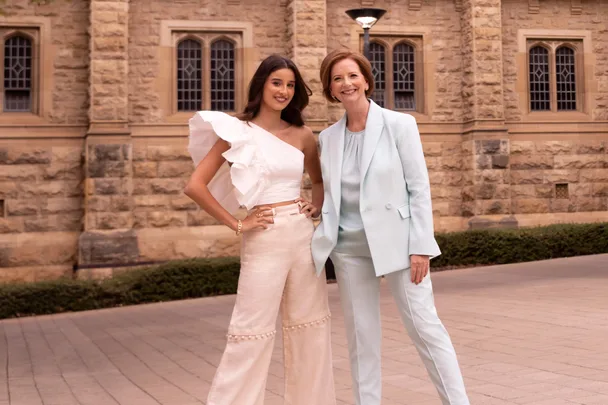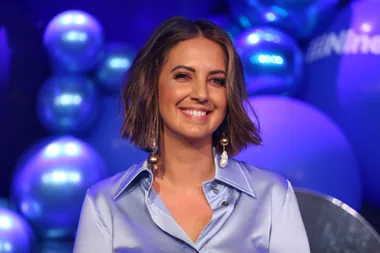All it takes is one person to enact change, but as these extraordinary women have discovered, pairing up with a like-minded companion will help you on your way.
Chanel Contos and Julia Gillard
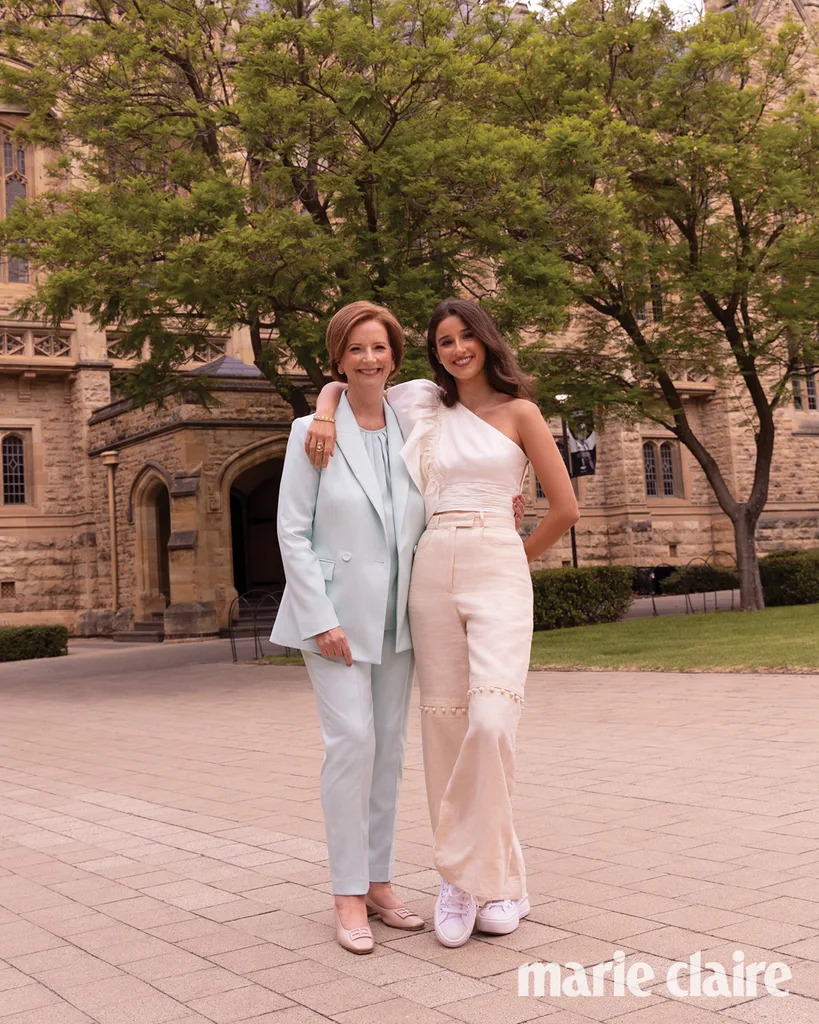
When the former Australian sex discrimination commissioner Elizabeth Broderick put sexual consent activist Chanel Contos in touch with her friend Julia Gillard, Australia’s 27th (and only female) prime minister invited the nervous young master’s student to lunch in London, where they were based. What has followed is a beautiful cross-generational friendship.
“One of the best ways women support women is by networking with people who can make a difference in our lives,” says Gillard, who chairs the Global Institute for Women’s Leadership. “That is what happened with Chanel and me. Our first conversation was both broad and deep.”
Contos says, “For me, women helping each other through friendship is something that should be a default because there’s enough space and power for us all. [Gillard is] always passionate, empathetic, and kind, and so willing to give me advice and support and help. She’s just a really cool person.”
She might not be a household name like her mentor yet, but Contos is set to leave her own mark on Australia’s history. Thanks to the Teach Us Consent petition and campaign she started in early 2021, Australia’s federal school curriculum will include mandatory sexual consent education from 2023. “That successful campaign is a remarkable achievement and I’m certain wouldn’t have occurred but for Chanel’s determination and advocacy,” says Gillard. “I want to understand how young women are seeing the world and she is helping me do that.”
Chelsea Bonner and Khadi Ja Gbla
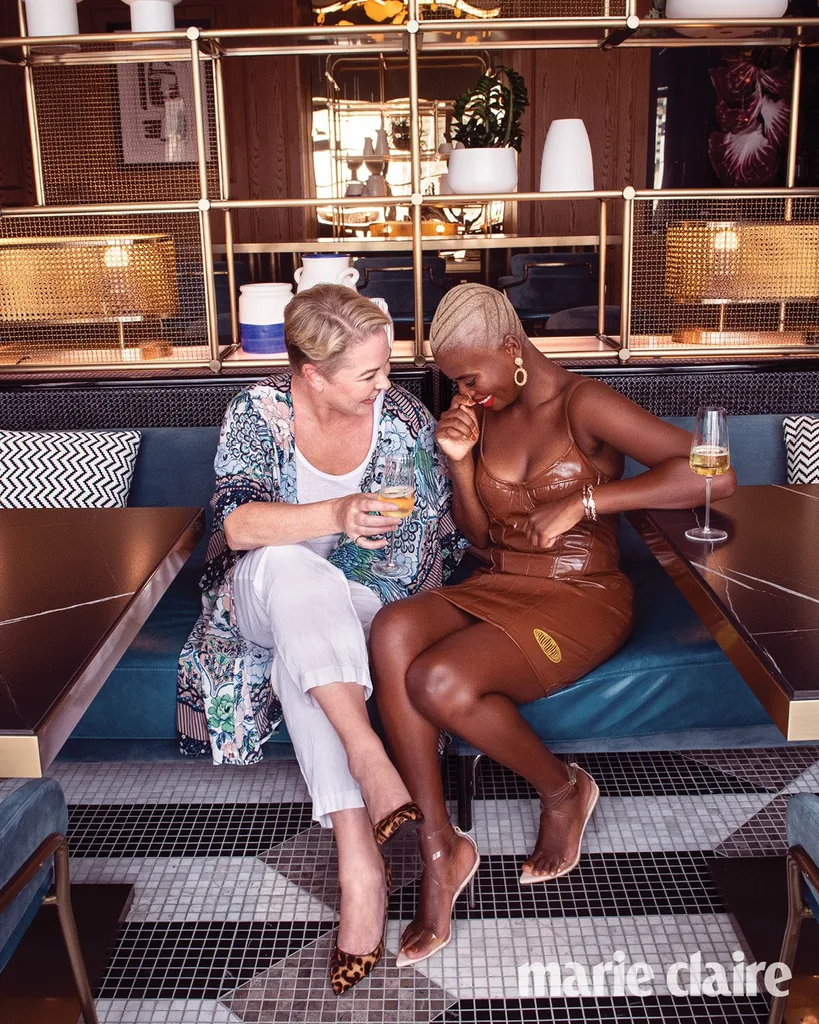
Little did human rights advocate and female genital mutilation (FGM) survivor Khadija Gbla know as she delivered her winner’s speech at the 2019 Woman of Style Awards, her future manager was part of the room’s standing ovation. But then, Chelsea Bonner, founder of pro-diversity modelling agency Bella Management, has always had a knack for discovering kindred spirits. “I knew that I had to find a way to raise her profile so every person in Australia was aware of the trauma of FGM,” says Bonner.
By the time Adelaide-based Gbla arrived home, Bonner’s carefully considered pitch to manage Gbla was in her email inbox. “She saw me and understood what I am about and trying to achieve,” says Gbla, a former refugee from Sierra Leone, whose 2014 TED Talk ‘Born a girl in the wrong place’ (about her FGM nightmare at age nine) has had nearly two million views. “I call her Mama Chelsea because she makes me feel protected so I can focus on my campaign.”
Their latest joint focus is a coordinated Covid relief drive for women and children in remote and vulnerable indigenous communities who are desperate for basic necessities such as food and sanitary products.
“Khadija is a true force of nature, and her motivation is so pure,” says Bonner. “Most people will never know the lengths she has gone to for them to be safe.”
Brooke Boney and Nakkiah Lui
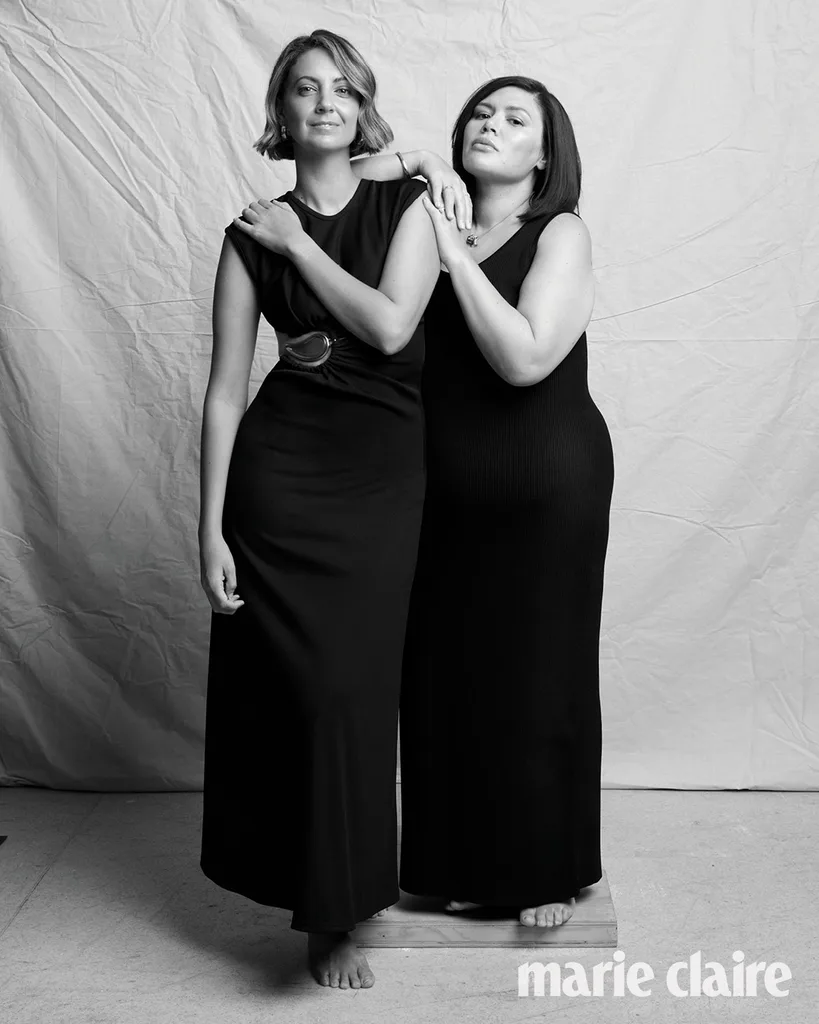
For Today presenter and journalist Brooke Boney and actor and writer Nakkiah Lui, meeting was inevitable. “The Aboriginal community can be really, really small, and then, once you are working in media, it gets even smaller,” Lui explains.
The pair initially connected on social media before meeting in person in 2018 at a magazine shoot celebrating high-profile female Indigenous voices. Boney recalls, “I remember looking around and thinking, ‘Wow, there’s only like three or four of us’.”
The pair became fast friends and found common ground on their passion to bring more Indigenous people and their voices to mainstream media in Australia. As a young journalist, “I had to really push to get people to consider our perspective,” Boney says. “It was always an afterthought.”
Lui can relate. “For so long in my career, I was the only Aboriginal person in most of the areas that I worked in,” she says. “To have to struggle to get people to understand your perspective and ask people to consider your humanity is exhausting.”
Shooting for marie claire four years on from their first meeting, Boney and Lui agree that Indigenous representation in television, film and advertising has come a long way in a short number of years, but still heavily feel the responsibility of ensuring voices other than their own are brought to the forefront.
“There was a while when news outlets always came to us for soundbites,” Boney says, “and it’s a huge responsibility to try to represent an entire community.” Lui agrees. “It’s not just about holding the door open,” she says. “It’s important to both of us to make sure there is a path for other people to walk through.
Kate Allman and Lucy Small
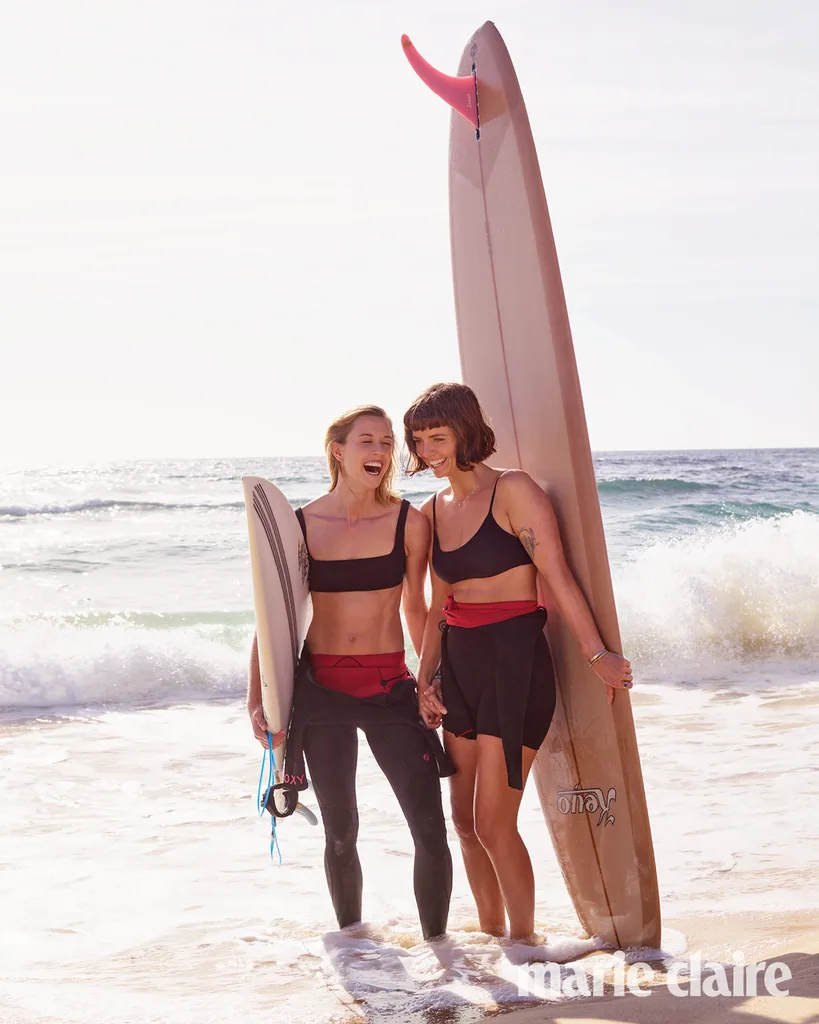
A media interview can be a bit like speeding dating, you have a small window of time to get to know one another and, unless you get lucky, that brief encounter is where you usually part ways. For surfer Lucy Small (pictured right) and sports journalist and lawyer Kate Allman, the pair were one of the lucky few.
“I didn’t know Lucy until she made her speech and was on the front cover of the newspaper,” recalls Allman after watching Small accept her first place surfing prize at the Curly MalJam Pro in April last year and then calling out the fact that the cheque was worth less than half the men’s prize money for the same conditions. “It made me so mad. I called my editor and said, ‘We need to do a story on this’.”
After interviewing Small, the pair got talking and decided now was the time for change. Using Allman’s legal background and Small’s newly established platform, the duo launched an Equal Pay for Equal Play petition, which has since seen Surfing New South Wales and Surfing Australia amend their rule books to help close the gender prize-money gap.
The campaign has also garnered support from crowned Aussie surfing champions Mick Fanning and Steph Gilmore. “When the hype died down, Kate was still there,” says Small. “There’s not really anything in it for her other than to hopefully make a change for women in sports.”
When asked what Allman saw in Small on television that day, she responds, “Lucy used her moment in the sun to not just win this prize, but to call out the injustice. The bravery I saw made me think that anyone can make a difference.”
Eve Moss Ractliffe and Izzy Raj-Seppings
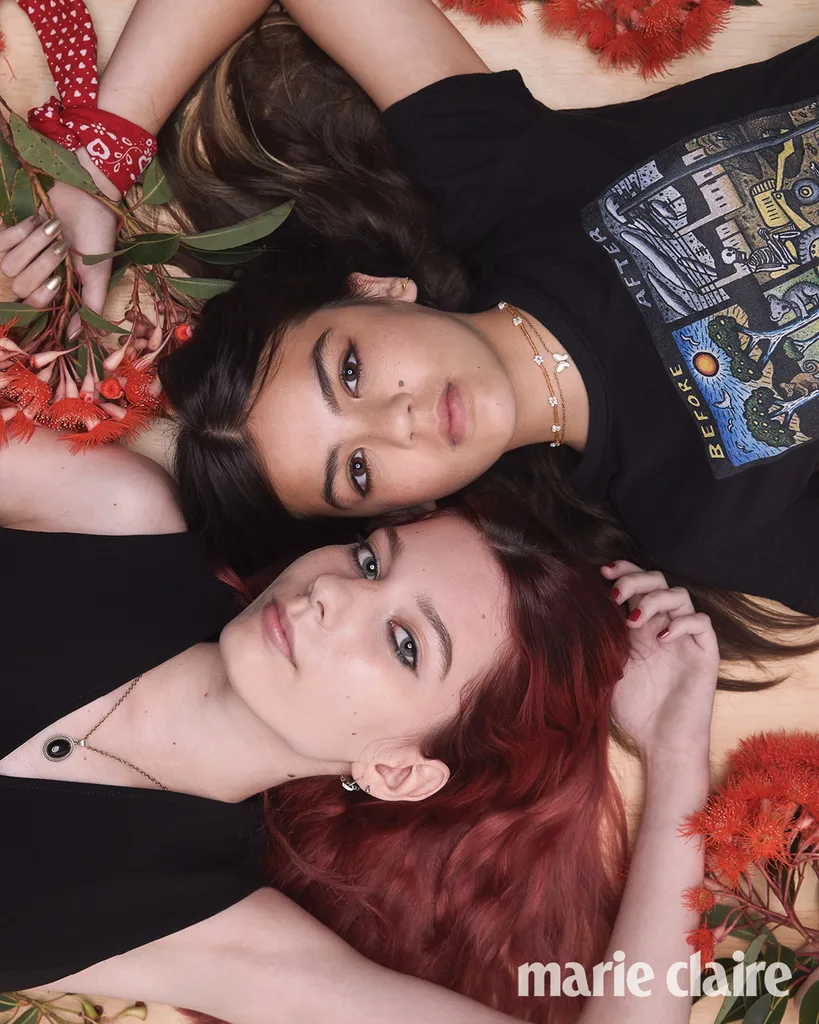
Her tear-stained face made global headlines in December 2019, as riot police outside Kirribilli House threatened her with arrest while protesting climate change during the deadly bushfires. But despite the outer chutzpah shown by then-13-year-old activist Izzy Raj-Seppings (pictured top right), it was inner nerves that later helped her bond with fellow activist Eve Moss Ractliffe at a School Strike 4 Climate rally.
“Eve was so funny and confident, she helped me feel more comfortable that day,” says Raj-Seppings of meeting her now best friend backstage at Sydney’s Town Hall. “Since then, she’s always been by my side, from protesting together to laughing/crying at 1am over Minecraft during lockdown.”
Fast forward to September 2020 and the duo – along with six other young Australians then aged 13 to 17 – filed a landmark class action against the federal environment minister in the Federal Court in an attempt to stop an extension to the Whitehaven Coal Mine near Gunnedah, NSW, from being approved. While the court dismissed the application for an injunction in May 2021, it made the landmark judgement that the minister has a duty of care to protect young people from climate-change harm.
The article originally appeared in the April issue of marie claire, on sale now.
